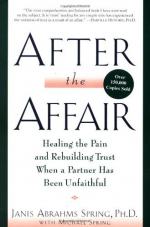
|
| Name: _________________________ | Period: ___________________ |
This test consists of 5 multiple choice questions, 5 short answer questions, and 10 short essay questions.
Multiple Choice Questions
1. After an emotional confrontation, how do women typically feel?
(a) More accepting of the affair.
(b) More vulnerable to pain.
(c) More likely to forgive.
(d) More intimate with their partner.
2. If forgiveness is offered too quickly, how can it affect the individual?
(a) It can trigger childhood memories.
(b) It can deepen the pain of the affair.
(c) It can damage their self-esteem.
(d) It can affect their personal identity.
3. How does the book view sex tools?
(a) Unnecessary if the marriage is working.
(b) Healthy if acceptable to both partners.
(c) Dangerous if used only with the lover.
(d) Integral to maintaining the excitement in intimacy.
4. Children need to function in which way?
(a) With supervision.
(b) Without boundaries.
(c) Independently.
(d) Dependently.
5. The genuine intention of an individual may be lost if the partner feels the behavior is only occurring for which reason?
(a) Because they were asked to change.
(b) Because their marriage was damaged.
(c) Because the affair was ended.
(d) Because they did not want to hurt the children.
Short Answer Questions
1. If a childhood experience is missing from a person's life, the person will compensate with patterned, negative behavior referred to with which term?
2. Which term is used to describe the refusal of one partner to discuss the affair?
3. A hurt partner may believe their unfaithful partner is intentionally trying to achieve which task instead of changing for good?
4. According to scientific studies and contrary to conventional beliefs, how is forgiveness viewed for the individual?
5. Which is an example of a behavior that may take a considerable toll on a partner?
Short Essay Questions
1. How can trust in a relationship be restored?
2. Why is intimate listening necessary to learn?
3. Why is intimate talk necessary to learn?
4. In the process of rebuilding trust, what is a couple most likely to come to a stalemate over?
5. As discussed in Chapter 9, why are there hazards associated with forgiveness?
6. How can an affair positively affect a marriage?
7. Why does the author recommend a 'covenant of promises' at the end of Chapter 9?
8. How can history repeat itself through children of unfaithful parents growing up to be unfaithful adults?
9. What are some assumptions an unfaithful partner could make about sexual intimacy?
10. What should happen with behaviors that violate trust in a relationship?
|
This section contains 777 words (approx. 3 pages at 300 words per page) |

|




